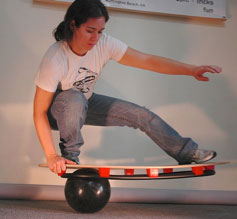Types of Reference Guides
Dictionary

Source: Woman on balance board, Si-BoardsA, Wikimedia Commons
We’ll focus on three useful tools. The first is the dictionary. You’ve probably looked up lists of words in the dictionary, written down the definitions, and then studied for a vocabulary test. That practice alone didn’t help you understand the words’ full, rich, connotative meanings or make you secure enough to use them when you spoke or wrote. You probably retained very few of the words from those lists.
Dictionaries work best when they’re part of a full program to improve your vocabulary, as one exercise on your way to linguistic fitness, as one tool among many to build a robust lexicon. Dictionaries and other reference guides should be balanced with wide reading and the practice of making educated guesses using context clues, Greek and Latin affixes, and cognates.
Dictionaries are best used for checking out the meanings of words you’ve already identified. Let’s take the word lexicon from the text above as an example. You might use this word when you write or speak, so it merits analysis. Let’s follow these steps to begin our investigation:
- Look for context clues. Vocabulary and linguistic are used as parallel words in the same sentence. Like these terms, “lexicon” must have something to do with words.
- “Lex” seems like a meaningful word part. If we deduce from the word dyslexia, it probably has to do with reading. Research reveals that it’s a Greek combining form that means “word.” Vocabulary still seems pertinent—perhaps a good synonym for lexicon.
- Next let’s confirm this reasonable guess by using an online dictionary at http://www.merriam-webster.com.
- The second entry in the definition confirms our guess.
Glossary
A glossary is a mini-version of a dictionary. A glossary is an alphabetical list of the more obscure and challenging words from one particular book. Most of your textbooks have glossaries. While dictionaries include multiple meanings of words, glossaries give only the meaning pertinent to how the word is used in the selection.
Read this next passage to find out how Kerry Michael Wood, a teacher and glossator (one who compiles glossaries), learns a valuable lesson about multiple meanings from a student.
In a class of Advanced Juniors a few years later, some of the students noticed that I was an author of the literature anthology they were using. “You wrote this book?” they asked. I responded that I was one of a group responsible for the questions and other editorial material including the teacher’s manual. “Then you must know all these words in the glossary,” someone said. With mock seriousness I answered in the affirmative.
They had me close my book and started quizzing me on glossary words that they didn’t know the meaning of and figured that I wouldn’t either. I was proud of my performance. The textbook had just been printed, and I remembered quite well the stories and poems included in it. Most of the words they asked me to define were fairly straightforward items like “palazzo,” “ottoman” and “harlequin.” I surprised myself by recognizing their mispronunciation of “passementerie.” I recalled the story it came from and that it referred to fancy edging or ornamentation on cloth or clothing. I was batting a thousand.
My self-esteem hit a peak when, after I correctly defined “sachem,” a student demanded the language it came from. I guessed, “Algonquian,” and enjoyed expressions of wondrous disbelief at my erudition. I stepped from behind my lectern assuming the game was over. A student named Patrick fired a last question.
“‘Fly?’ Mr. W.”
Puzzled, I offered, “to move or pass through the air?”
“Alternative meaning,” he said.
Looking down I saw that my trouser zipper was open. Victorious pride dissolved into blushing embarrassment as I reached down and righted the situation.
Thesaurus
While a dictionary is best used to confirm or refute the meaning of a word, a thesaurus is a reference guide you use to search for a new word or a new way of saying something. When you find that you’re overusing a word like stuff, you can click on the thesaurus to find alternatives such as junk, gear, or material. And what about the vague and overused word thing? Click on the thesaurus to find synonyms such as object, article, item, gadget, device, or contraption that will add interest and variety to your writing.
You still need to use good judgment when using a thesaurus. In one episode of Friends, Joey writes a letter by making extensive use of this tool. As his friends start to read Joey’s “smart” recommendation letter, they discover he’s used the thesaurus for every word, even for his signature, “Baby Kangaroo.”
Here’s one of Joey’s pre-thesaurus sentences:
“They’re warm, nice people with big hearts.”
Here’s the same sentence, post-thesaurus:
“They’re human prepossessing Homo sapiens with full-sized aortic pumps.”